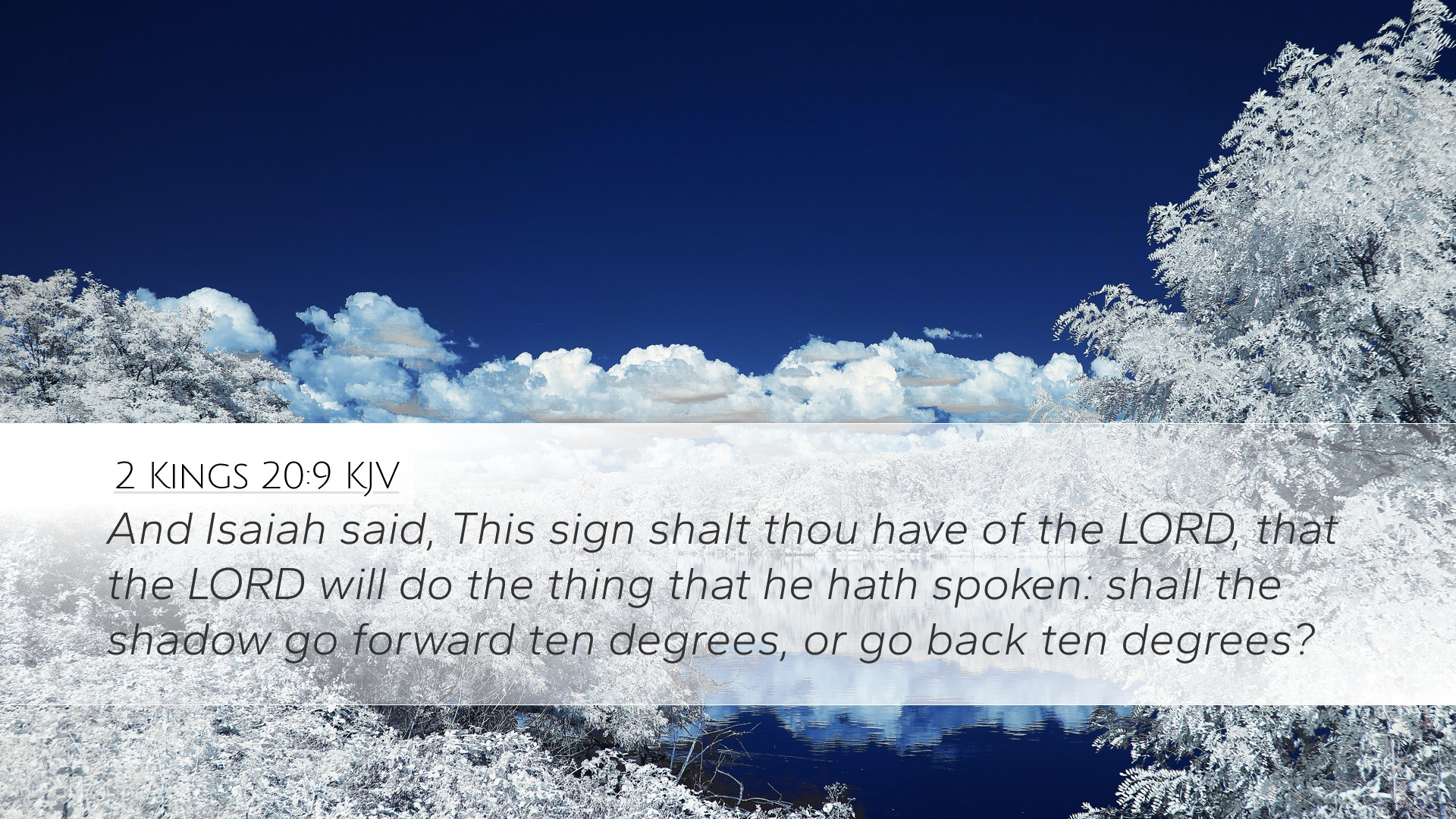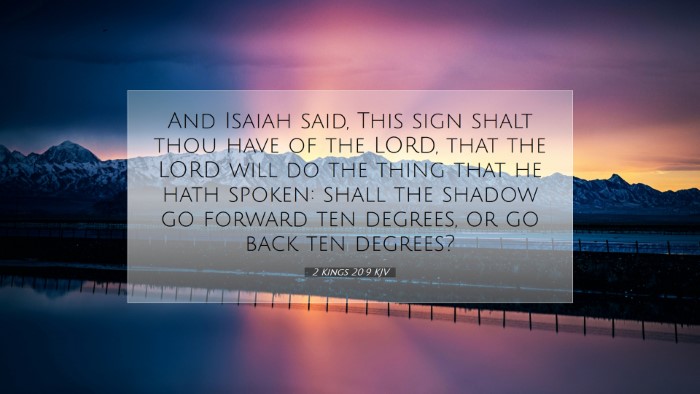Old Testament
Genesis Exodus Leviticus Numbers Deuteronomy Joshua Judges Ruth 1 Samuel 2 Samuel 1 Kings 2 Kings 1 Chronicles 2 Chronicles Ezra Nehemiah Esther Job Psalms Proverbs Ecclesiastes Song of Solomon Isaiah Jeremiah Lamentations Ezekiel Daniel Hosea Joel Amos Obadiah Jonah Micah Nahum Habakkuk Zephaniah Haggai Zechariah Malachi2 Kings 20:9
2 Kings 20:9 KJV
And Isaiah said, This sign shalt thou have of the LORD, that the LORD will do the thing that he hath spoken: shall the shadow go forward ten degrees, or go back ten degrees?
2 Kings 20:9 Bible Commentary
Commentary on 2 Kings 20:9
Verse Context:
2 Kings 20:9 presents a pivotal moment during the reign of King Hezekiah, a king known for his faithfulness to the Lord and for his reforms in Judah aimed at restoring true worship. This verse primarily deals with the sign that God provided to Hezekiah as a reassurance of His promise.
Text of 2 Kings 20:9
“And Isaiah said, This sign shalt thou have of the Lord, that the Lord will do the thing that he hath spoken: shall the shadow go forward ten degrees, or go back ten degrees?”
Summary of Commentary Insights
Introduction
In this passage, Isaiah delivers a sign from God to Hezekiah, affirming God's promise regarding his health and the fate of Judah. The sign is not merely a miracle but serves to bolster Hezekiah’s faith, illustrating the interplay between divine assurance and human belief.
The Nature of the Sign
Understanding Signs: The request for a sign and God’s provision of it is significant. Commentators like Albert Barnes emphasize that signs in Scripture often serve to confirm God's word and encourage faith. The sign of the shadow moving backward or forward signifies God's power over nature and time, reinforcing His omnipotence.
Hezekiah’s Response
Hezekiah's Dilemma: Hezekiah’s response to Isaiah's proposal of the sign reflects a modesty and humility in his faith. Matthew Henry notes that Hezekiah’s request for the shadow to move backward instead of forward indicates his deep trust in God’s capabilities, going beyond the natural order. He would rather see an extraordinary sign that would affirm God's intervention in his life and the life of his kingdom.
Theological Implications
Divine Assurance: The act of providing a sign illustrates God’s willingness to engage with humanity and provide assurance. Adam Clarke argues that this interaction reveals God's grace and mercy. The gravity of Hezekiah’s condition—a terminal illness—is met with God's miraculous intervention, embodying the belief that divine mercy can alter the course of human affliction.
Moving the Shadow: Symbolism and Significance
- Forward vs. Backward: The choice between the shadow moving forward (a natural progression of time) or backward (a miraculous reversal) serves as a metaphor for God’s sovereignty over time and history. This reflects the theme of restoration—God not only heals but also revitalizes the path ahead of His people.
- Historical Context: The request for a backward movement may also imply a nostalgia for lost time or a longing to redeem past failures, as noted by Henry. It symbolizes the deeper human desire to reclaim moments wasted or squandered in sin.
Faith in God's Promises
Jesus' Assurance: Drawing parallels with the New Testament, the assurance shown here is echoed in Christ’s promises. Just as God granted a sign to Hezekiah, Jesus provides believers assurance in their faith journey. Barnes emphasizes that faith not only believes in God’s power but also finds rest in His promises.
Applications for Today
For Pastors and Theologians: The verse and accompanying commentary invite leaders in faith to consider how they address the needs of their congregations. The assurance God provided to Hezekiah can inspire sermons focusing on God’s unwavering support and the importance of seeking signs in our faith amidst uncertainties.
For Students: The intricate details and historical context around this passage illuminate the importance of understanding biblical texts through prayer and study. Students are encouraged to recognize that God’s signs might often appear in their lives as confirmations of faith, urging them to remain steadfast amidst trials.
For Theologians: The engagement between Hezekiah and God raises questions on divine interaction with humanity. The nature of miracles and signs challenges scholars to explore how faith, sovereignty, and grace operate within the narrative of salvation history.
Conclusion
The sign given to Hezekiah in 2 Kings 20:9 serves as a powerful reminder of God’s faithfulness and omnipotence. As Hezekiah trusted in the Lord during his critical time of need, so too are believers today encouraged to place their faith in God's promises, to seek divine assurance, and to recognize that God’s intervention can lead to restoration and healing.


